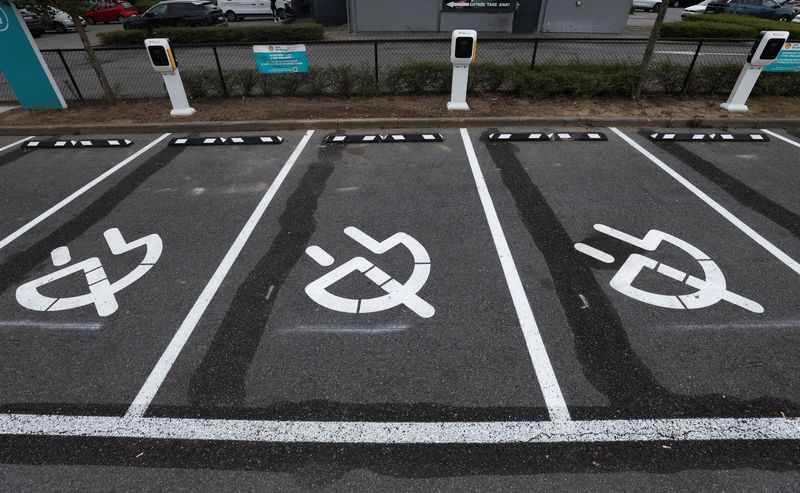By Gilles Guillaume and Alessandro Parodi
PARIS/GDANSK (Reuters) – European automakers are raising prices of petrol cars and readying discounts on electric vehicles as they brace for yet another challenge – tougher emissions rules that threaten to further shrink profits across the struggling industry.
The European Union will drastically lower its cap on automotive carbon dioxide emissions from Jan. 1, meaning at least one-fifth of all sales by most car companies must be EVs to avoid heavy fines.
But so far this year only 13% of all vehicles sold in the region have been electric, data from the European Automobile Manufacturers’ Association ( ACEA (BIT:ACE)) lobby group shows.
“The gap is really big,” said Marc Mortureux, director of French car lobby PFA.
The tighter rules come as the sector is already dealing with excess capacity due to lacklustre sales and growing Chinese competition, prompting profit warnings from Volkswagen (ETR:VOWG_p), Stellantis (NYSE:STLA) and others in recent months.
Now the companies will need to sell more EVs, which cost more to make than traditional vehicles, at a time when political and economic uncertainties and declining EV subsidies are deterring consumption, said Mortureux.
In a sign of the growing concern over the rules, Stellantis CEO Carlos Tavares abruptly resigned this month, partly due to disagreement with the board over how to deal with the issue.
STEERING DEMAND
With just weeks to go, Europe’s politicians are urging Brussels to rethink the targets. But carmakers are getting to work, aiming above all to avoid fines that could reach 15 billion euros ($15.76 billion) based on current sales, ACEA chairman Luca de Meo has said.
VW, Stellantis and Renault (EPA:RENA) have raised the prices of petrol engine models by several hundred euros in the last two months, in what analysts say is an attempt to curb demand for heavier emitters and make pricier electric models appealing.
“Carmakers have started with their pricing strategy to steer demand towards battery EVs in order to reach the CO2 targets and avoid potential fines,” said Beatrix Keim of the Center for Automotive Research.
Last month, Stellantis’s Peugeot (OTC:PUGOY) hiked prices in France of all of its models apart from fully electric ones by as much as 500 euros.
Renault Group increased prices on some pure petrol models, for instance adding 300 euros or 1.6% to the Clio SCE 65, but kept prices of hybrid versions unchanged.
Peugeot described the new pricing as an “economic rise”, while Renault said a rise was “normal” over a car’s lifetime.
The strategy could backfire, however. Increasing petrol car prices should help close the gap with more expensive EVs, but given weak market growth, may not generate enough EV sales, said a source close to a major European automaker.
Sales in the region are around a fifth lower than pre-COVID.
“In reality, increasing the price of thermal engine cars means cutting production (…) and all the value chain and suppliers will suffer from this,” the source added.
DISCOUNTS AND POOLING
The price rises will help fund future discounts on EVs, said Denis Schemoul, auto analyst at S&P Global, acting as “an indirect subsidy” for electric car buyers by combustion engine buyers, but very likely hurting margins.
VW, expected to be hit hardest by the new targets due to its high sales volumes, has already cut the price of its ID3 electric compact car on several markets in recent months, bringing it below 30,000 euros in Germany.
“This is probably what will happen next year,” said Alastair Bedwell, head of powertrain forecasting at GlobalData, who predicts EV sales in Europe, including the EU as well as Britain, Iceland, Liechtenstein, Norway and Switzerland, will jump 41% from this year to 3.1 million units in 2025.
Discounting to push sales comes at a cost, however. In the UK, the sector has warned that EV targets will cost automakers 6 billion pounds ($7.6 billion) this year, including about 4 billion pounds in discounts.
“Pooling” emissions, or buying credits from those who have a large share of the EV market to lower emission averages, could be less costly, say Barclays (LON:BARC) analysts.
Japan’s Suzuki agreed in October to pool with Geely-owned Volvo (OTC:VLVLY) in 2025, a spokeswoman said.
That arrangement will almost completely remove any threat of fines for Suzuki, said Charles Lester, data manager at battery consultancy Rho Motion, given Volvo’s large number of EVs on offer.
ENOUGH IS ENOUGH
All options will eat into meagre industry profits, however, and the industry is still hoping Brussels will ease targets.
“At some point, enough is enough,” PFA president Luc Chatel told reporters in October ahead of the Paris auto show.
“I can’t sell enough electric vehicles and I’m going to be penalized on my thermal vehicles. What do they want me to make, horse-drawn carriages?”
($1 = 0.9519 euros)
($1 = 0.7920 pounds)



